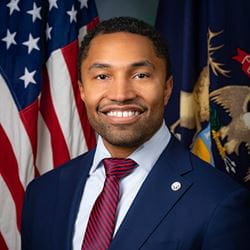The web Browser you are currently using is unsupported, and some features of this site may not work as intended. Please update to a modern browser such as Chrome, Firefox or Edge to experience all features Michigan.gov has to offer.
Homeless veterans served our country. Now we should serve them
September 28, 2023

By MVAA Director Adam Hollier
From the rural communities of the Upper Peninsula to the urban corridors of Metro Detroit, thousands of Michigan’s military veterans are living in shelters, on the streets or crashing on friend’s couches and it is completely unacceptable.
These veterans put their lives on the line for our country and now they’re homeless.
It’s a longstanding and widespread problem. Today, according to the best available data, there are 21 homeless veterans living in Dickinson County in the western U.P. One hundred seventy-three homeless veterans in southern Michigan’s Calhoun County. Six hundred homeless veterans in Wayne County, home of Detroit.
In all, 2,443 Michigan veterans—many with families—are homeless, according to the Homeless Management Information System. But this figure represents just those homeless veterans who have sought out services. As just about every expert and veteran advocate knows, that number is much higher based on the fact that so many of our homeless veterans go uncounted.
While some progress has been made over the past few years, veteran homelessness remains a persistent and complex challenge spanning the demographic groups. Veterans of color continue to be over-represented in the homeless population. We’ve seen a huge increase in the number of older veterans experiencing homelessness. Women veterans are twice as likely to become homeless as non-veteran women.
Under the Whitmer administration, the state of Michigan invested $2 million this year to combat the problem through the Michigan Veteran Homelessness Prevention Grant. The Michigan Veterans Affairs Agency (MVAA) will distribute these funds, in the form of $150,000 grants, to entities around the state that serve homeless veterans and their families. In particular, the MVAA is looking for innovative approaches to supporting homeless veterans from all backgrounds and eras.
To fully attack the problem of veteran homelessness, we must address the underlying factors, starting with an overall lack of affordable and safe housing. Substance abuse, mental health challenges and financial insecurity also play a role. Importantly, too many of our veterans experience social isolation after rejoining civilian life and fail to get connected to a meaningful support network.
But help is out there—throughout the state of Michigan. At the MVAA, our mission is to connect Michigan veterans to the local, state and national resources that can help them thrive in all facets of life and avoid the crises that can lead to homelessness and suicide. Whether it’s connecting a veteran to a Veteran Service Officer to help them file a VA disability claim, lining them up with a peer mentor through our Buddy to Buddy program or linking them to emergency assistance or employment, education and health care benefits, we’re here for all veterans and their families.
September is Suicide Prevention Month and we are tired of losing veterans to suicide because they are facing eviction or can’t provide adequate housing for their families. As we prepare to recognize World Homeless Day on Oct. 10 and Homeless Awareness Month in Michigan in November, it’s important to remember that those veterans who are sleeping in their cars and asking for help on street corners once
put their lives on the line to serve our country. We should do everything within our power to help them thrive as civilians. How can you help?
- Veterans. Call us at 1-800-MICH-VET or visit Michigan.gov/MVAA for assistance.
- Homeless service providers: Apply for a Michigan Veteran Homelessness Prevention Grant. Letters of intent are due by 5 p.m. on Sept. 29. ·
- Organizations and businesses: Join our Michigan Veteran Connector program to better reach and serve your customers and clients who are veterans.
- All of us: Volunteer time at food banks, community kitchens, homeless shelters or VA medical facilities. We can also volunteer at Veterans Stand Down events, which provide supplies and other services to homeless veterans. Or we can donate to the National Coalition for Homeless Veterans.